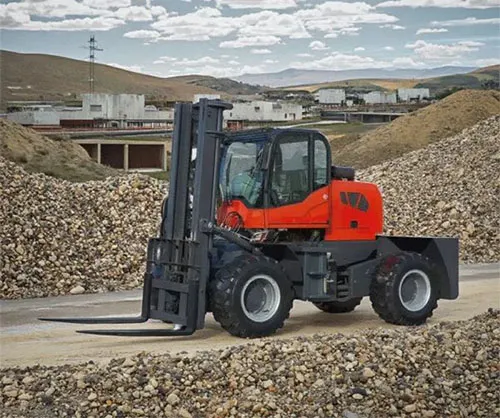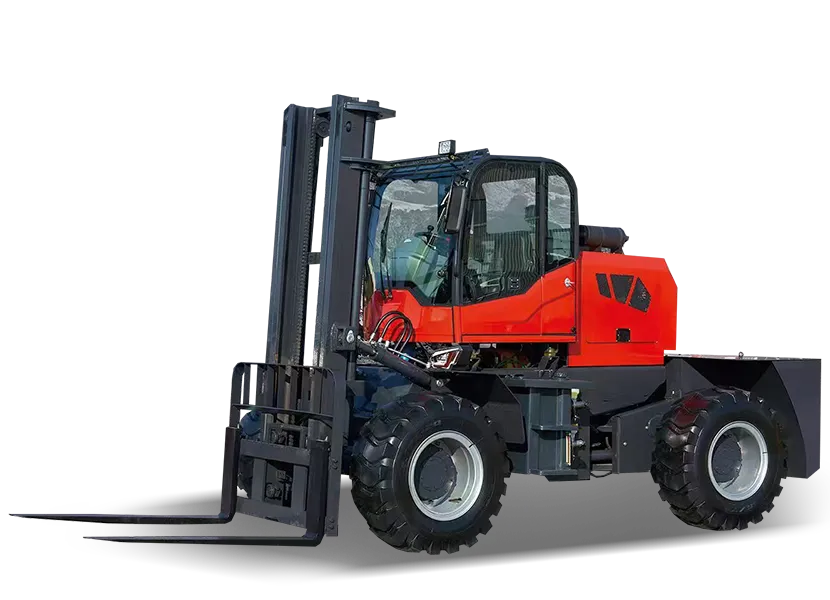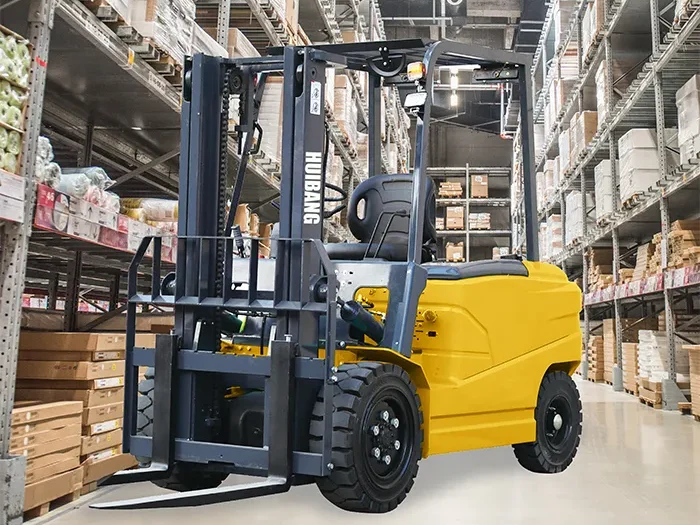Avoid your inquiry is delay response, please enter your WhatsApp/Skype along with the message, so we can contact you at the very first time.
We will reply you within 24 hours. If for urgent case, please add WhatsApp/WeChat: +86 16652801818,. Or call +86 16652801818 directly.
*We respect your confidentiality and all information are protected. We will only use your information to respond to your inquiry and will never send unsolicited emails or promotional messages.
Do heavy loads, uneven ground, and tough outdoor environments slow down your operations? It’s frustrating when traditional forklifts fail on bumpy, rugged surfaces. A rough terrain forklift is the robust solution designed specifically to handle your most challenging worksites.
A rough terrain forklift is a heavy-duty, all-terrain forklift built with large pneumatic tires, superior ground clearance, and powerful engines, enabling it to carry heavy loads safely over uneven surfaces and outdoor jobsites. It’s ideal for construction sites, agriculture, and any work requiring robust lifting and high reliability.

A rough terrain forklift is a specialized type of forklift designed for outdoor work and challenging surfaces. Unlike standard industrial trucks, it features large pneumatic tires and high ground clearance to easily traverse rocky, uneven construction sites, agricultural fields, or even dockyards. As a construction equipment manufacturing plant, we understand the challenges our customers face—especially construction contractors, farmers, landscaping pros, machinery renters, and public sector projects. Such users require not just any forklift, but a robust, high-capacity rough terrain forklift that can handle heavy loads reliably where others can’t.[rough terrain forklifts]
Rough terrain forklifts are available in several configurations, the most common being the vertical mast and the straight mast rough terrain forklift. These are engineered for dependability and ease of use—a priority for teams that want to maximize uptime and minimize hassle.
Rough terrain forklifts are designed to withstand tough weather conditions and unpredictable outdoor environments. Brands like JCB are industry leaders, but as a dedicated manufacturer, we focus on customization and field-tested durability to serve your business’s specific demands.
Rough terrain forklifts are purpose-built to tackle uneven ground and other challenging outdoor obstacles thanks to several unique features:

If you need to transport heavy loads across a road construction site, handle rough materials in forestry, or move pallets on sand or gravel, a rough terrain forklift from an experienced manufacturer is your safest and most efficient choice.[rough terrain fork truck]
Operating a rough terrain forklift requires specific training and certification to ensure both safety and compliance:
Why Get Certified?
Please note: Proper training isn’t just a checkbox—it’s vital for everyone’s safety. Certification is also often required by large clients or public tenders.
Rough terrain forklifts are mighty, but safety comes first for every forklift operator. Here are top safety tips:
1. Follow OSHA Forklift Safety Rules
2. Mind the Load
3. Master the Machine

Quick Safety Facts Table
| Safety Item | Action |
|---|---|
| Certification | Must be current and specific to rough terrain use |
| Inspections | Daily before operation |
| Tires | Check for damage/loss of pressure |
| Loads | Don’t exceed max capacity; secure properly |
| Environment | Look for slopes, mud, rocks, and other hazards |
Building a forklift safety culture is essential for preventing accidents, boosting productivity, and staying compliant with OSHA and other regulatory authorities.
Explore more on rough terrain forklift safety.
Selecting the right power system is crucial when choosing a rough terrain forklift:
Diesel Rough Terrain Forklifts
Electric Rough Terrain Forklifts

Infographic: Pros and Cons Comparison
For most construction, agricultural, landscaping, and rental businesses tackling rough conditions, diesel is the primary power system due to reliability and capacity.
Check out our electric forklifts for indoor use if your jobsite switches between environments.
There’s rising demand for used rough terrain forklifts—and for good reason! Buying used can be cost-effective, but there are important considerations:
When you buy used, always inspect critical components and request a test drive on rough surfaces to verify traction and stability.
Browse used rough terrain forklifts for sale.
Rough terrain forklifts thrive in industries where ordinary forklifts can’t:
Construction Contractors
Farmers & Agri Dealers
Landscaping & Forestry
Machinery Rental Companies
Government/Public Tenders
Each sector prioritizes durability, strength, ease of use, load capacity, and a powerful, efficient drivetrain—features our rough terrain forklifts deliver.
Here’s a focused checklist:
1. Inspect the Tires
2. Evaluate the Mast and Chassis
3. Review Maintenance Records
4. Test Drive on Rough Surfaces
5. Confirm Operator Certification Requirements
For more buying advice, see our rough terrain forklift truck guide.
What tire type is best for rough terrain forklifts?
Large pneumatic tires are the best choice for rough terrain forklifts, providing maximum traction, shock absorption, and durability on rocky or uneven ground.
What is the OSHA classification for rough terrain forklifts?
Rough terrain forklifts are classified under OSHA’s Class VII for industrial trucks intended for outdoor use on challenging surfaces and construction sites.
Can rough terrain forklifts be used indoors?
While possible, rough terrain forklifts are optimized for outdoor use. Their size, tire type, and emissions (if diesel) may make them unsuitable for confined indoor spaces.
How often do forklift operators need recertification?
Certification is typically valid for three years. Operators should undergo refresher rough terrain forklift training and evaluation according to OSHA and local regulations.
What are the common hazards when operating a rough terrain forklift?
Top hazards include tipping due to unstable ground, overloading the mast, inadequate visibility, and failure to secure heavy loads. Always follow best safety practices and operate only with proper certification.
How do I choose between straight mast and telescopic rough terrain lifts?
Straight mast forklifts are ideal for high, stable lifts with heavy pallets, while telescopic models (telehandlers) add reach for stacking or placement over obstacles.